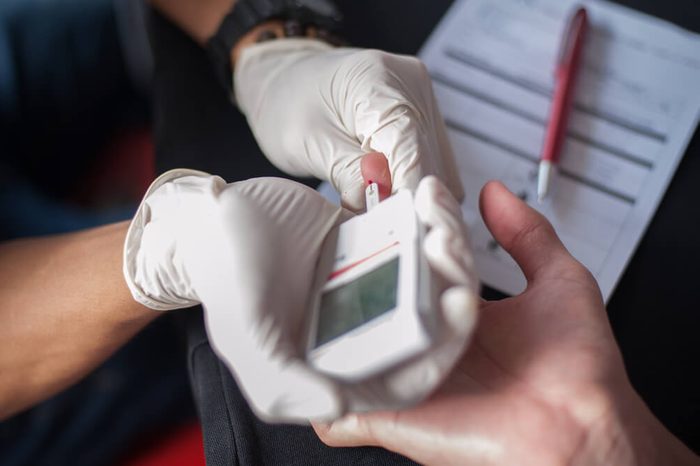What is vitamin D3?
First things first. Vitamin D3 (also known as cholecalciferol) is the most common and bioavailable form of vitamin D. Although there aren’t many natural food sources of Vitamin D, there are some that can supply your daily need, such as UV exposed mushrooms. Other foods are also fortified with vitamin D. However, the most common route is from sunlight on your skin. Although the vitamin is essential for a long list of bodily functions, many people don’t get nearly enough—especially in the winter. “Most people need supplements,” says greater New York City-area registered dietitian nutritionist Jessica Levinson, RDN.

How much you need and how best to actually get it
According to the FDA, the Recommended Dietary Allowance for vitamin D is 600 IU for adults. Those over 70 require more, so the RDA for them is 800 IU. However, it can be hard to meet this dose in winter. “Vitamin D3 isn’t found in many foods, but some dairy products, cereals, and grains are fortified with vitamin D3 to help people increase their intake,” says Craig Elbert, CEO of Care/of in New York City.
Fatty fish such as salmon, tuna, and sardines as well as eggs and shiitake mushrooms are other dietary sources of vitamin D3, but it’s important to note that the metabolism of vitamin D3 from our foods may be dependent on adequate iron status, says Texas nutrition expert Pam Machemehl-Helmly, founder and chief science officer of Wellnicity. Test your blood levels for vitamin D and iron to know your status.

Boosts your mood
Your brain has vitamin D3 receptors, points out Machemehl-Helmly. “Low levels of vitamin D3 may contribute to issues with mood. That’s because it’s a nutrient that helps the body make neurotransmitters—chemical messengers that help regulate our mood,” she says. Here are some more nutrients that can wreck your mood if you fall short.

Protects your heart
Vitamin D3 may play a role in regulating blood sugar and ultimately supporting long-term heart health, according to Elbert. “It’s also important to remember that the body’s functions are all interconnected, so when we support one aspect, like bone health, we’re supporting all of our essential functions,” he explains.

Strengthens your bones
Amy Shapiro, RD, and founder of Real Nutrition NYC notes that vitamin D3 helps regulate calcium and phosphorus, which leads to healthy, strong bones. “It’s also needed for bone growth and formation,” she says. “Vitamin D3 deficiencies can lead to an increased risk of bone fractures and osteoporosis.” But, be aware: there are other habits that may be giving you osteoporosis.

Helps prevent cancer
Vitamin D3 may play a role in cancer prevention—specifically colon, prostate, and breast cancers. The theory makes sense. Because the vitamin helps regulate cell growth, it may potentially stall the development of new blood vessels in cancerous tissues. However, both Shapiro and Levinson note that more research is needed.

Preserves your memory
Remember those vitamin D3 receptors in your brain? When they don’t get enough D3, they may malfunction and increase your risk of dementia. In fact, a review published in a 2018 issue of Cureus noted that “…vitamin D is essential to maintain important functions of the body such as calcium homeostasis, maintenance of skeleton integrity, and neurodevelopment.” Vitamin D deficiency, the review states, is associated with several problems including dementia, depression, diabetes mellitus, autism, and schizophrenia. Therefore, they encourage ongoing studies to learn more about their brain health potential.

Boosts your immunity
Vitamin D3 is a reparative vitamin. “The cells that make up our immune system need vitamin D3 to fight pathogens such as viruses and other germs,” explains Machemehl-Helmly. “When the levels of vitamin D3 are deficient or insufficient, you may get sick more often and possibly not be able to properly fight infection.” Here are more ways you may be sabotaging your immune system.

Calms your blood pressure
According to Machemehl-Helmly, vitamin D3 plays a role in modulating the system that controls blood pressure. However, this isn’t set in stone. The Mayo Clinic says that vitamin D deficiency “may be linked to heart disease and an increased risk of high blood pressure (hypertension).” At the same time, more research is needed. “It’s too early to say whether a lack of vitamin D causes high blood pressure, or whether vitamin D supplements may have any role in the treatment of high blood pressure,” the Mayo Clinic notes.

Soothes your stomach
Vitamin D3 plays a role in modulating the inflammatory processes in the gut, which is why, according to Machemehl-Helmly, those with inflammatory bowel diseases such as irritable bowel syndrome tend to have lower levels of vitamin D3. “Low levels of vitamin D3 may result in increased inflammation in the digestive tract which can exacerbate symptoms associated with IBS.”

Gives you better gym results
According to Levinson, vitamin D3 has been shown to help improve muscle strength, balance, and physical performance by improving muscle metabolism. That’s right, this vitamin can help you get fit!

May help with diabetes
“Some studies show vitamin D3 helps to regulate insulin levels, which can help with diabetes management,” says Levinson. “Vitamin D3 may contribute to blood sugar balance by supporting the actions of insulin and promoting the health of pancreatic cells,” explains Machemehl-Helmly.

